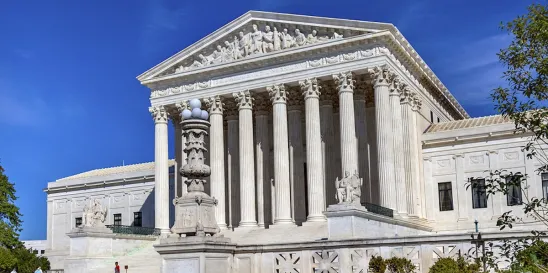President Joe Biden has nominated Ketanji Brown Jackson, a judge on the U.S. Court of Appeals for the District of Columbia Circuit, to the U.S. Supreme Court. Fulfilling a campaign promise to nominate the first African American woman to serve on the high court, President Biden has named an experienced jurist with Ivy League credentials to succeed Associate Justice Stephen Breyer.
Judge Jackson graduated magna cum laude from Harvard University in 1992 and cum laude from Harvard Law in 1996. After law school, she was a law clerk to Judge Patti B. Saris of the U.S. District Court for the District of Massachusetts, then clerked for Judge Bruce M. Selya of the U.S. Court of Appeals for the First Circuit. From 1999-2000, she served as a law clerk to Justice Breyer.
In addition to stints in private practice, Jackson also served as assistant special counsel to the U.S. Sentencing Commission and as an assistant public defender in Washington, D.C.
Judicial Appointments
In 2021, Judge Jackson was tapped by President Biden for the D.C. Circuit Court to fill a vacancy left by Judge Merrick Garland when he accepted the role of U.S. Attorney General. The Senate approved her appointment in a 53-44 vote. During her confirmation hearings, she described her judicial approach: “I’m looking at the arguments, the facts and the law, I’m methodically and intentionally setting aside personal views, any other inappropriate considerations and I would think that race would be the kind of thing that would be inappropriate to inject in my evaluation of a case.”
Judge Jackson was elevated to the D.C. Circuit Court following nearly a decade as a federal judge on the U.S. District Court for the District of Columbia. President Barack Obama nominated her to the bench in 2012. During her near decade-long tenure as a federal District Court judge, she honed her expertise in cases involving federal agency and administrative law. As a District Court judge, Judge Jackson presided over 86 administrative law cases, 40 cases involving questions of civil procedure, and 34 labor and employment matters.
Judge Jackson may be best known for a 2019 decision rejecting then-President Donald Trump’s assertion that White House staff may not be compelled to testify before Congress. “Presidents are not kings,” she famously wrote in a 118-page opinion in Comm. on the Judiciary v. McGahn, 415 F. Supp. 3d 148 (D.D.C. 2019). “This means they do not have subjects, bound by loyalty or blood, whose destiny they are entitled to control.” On the whole, Judge Jackson’s opinions are more pragmatic than ideological; it is difficult to predict where she will side on the numerous hot-button social and political issues that the Supreme Court has recently taken up.
Employment Law Decisions
Judge Jackson has a well-developed body of employment law decisions. In Von Drasek v. Burwell, 121 F. Supp. 3d 143 (D.D.C. 2015), Judge Jackson granted the employer’s motion for summary judgment with respect to the plaintiff’s discrimination and retaliation claims but found that neither party was entitled to summary judgment on plaintiff’s failure-to-accommodate claim. The plaintiff, Susan Von Drasek, worked for the United States Food and Drug Administration (FDA) as a chemist. Thirty years prior to her employment with the FDA, she was diagnosed with bipolar disorder. She did not inform anyone at the FDA of her diagnosis; nor did she request accommodations at the time of her hire or a year later, when she allegedly began having trouble at her job because of her condition. She requested an accommodation and medical leave for the first time only after she learned her supervisor had proposed terminating her employment for performance issues. Von Drasek filed a lawsuit, alleging the FDA failed to accommodate her disability, intentionally discriminated against her because of a disability, and retaliated against her, all in violation of the Rehabilitation Act of 1973.
Likewise, in Mitchell v. Pompeo, No. 1:15-cv-1849 (KBJ), 2019 U.S. Dist. LEXIS 54797 (D.D.C. Mar. 31, 2019), a trainee for a special agent position with the Foreign Service filed suit after she was terminated because she could not pass a timed 1.5 mile running test after several attempts. The plaintiff suffered from asthma and claimed that her disability was the reason for her inability to meet the physical fitness requirement. Judge Jackson concluded that being physically fit was an essential function of the position, relying on the employer’s expert testimony and other evidence. Judge Jackson held that the plaintiff did not present evidence from which a reasonable jury could find she could have performed the essential functions of the special agent position, even with accommodation. However, Judge Jackson concluded that the plaintiff may have been able to perform a different position for the employer. The plaintiff had made various requests for accommodation before she was fired, including reassignment, and Judge Jackson concluded that the employer failed to show there was no open position that she could have performed. Therefore, she held that a question remained whether there were other available positions for which she was qualified but not considered. Finding that there was a material issue of fact as to whether the employer sufficiently engaged in the interactive process, Judge Jackson denied both parties’ motions for summary judgment.
In Raymond v. Architect of the Capitol, 49 F. Supp. 3d 99 (D.D.C. 2014), Judge Jackson granted summary judgment to an employer in a discrimination suit brought by a 56-year-old Black employee of Jamaican national origin. The plaintiff was interviewed for a promotion by a three-member hiring panel. According to the plaintiff, one panel member, a second-level supervisor, previously had commented on the plaintiff’s Jamaican ethnicity and age — telling the plaintiff twice a month or so that the plaintiff was “getting old” and that he should use accrued sick leave rather than come to work with a walking stick. Judge Jackson rejected the plaintiff’s assertion that the stated reasons for his promotion denial were pretext. She saw no evidence the lone panel member’s alleged animus influenced the other panelists’ assessments, both of whom independently concluded that another applicant was more qualified — which “effectively insulated the selection determination from challenge,” Judge Jackson wrote. Even if the plaintiff could produce evidence supporting his allegations regarding the panel member’s comments, there was no evidence the other panel members harbored discriminatory animus.
In Sourgoutsis v. United States Capitol Police, No. 16-cv-1096 (D.D.C. July 20, 2021), Judge Jackson held that the limited success obtained by a plaintiff at trial in a sex discrimination case did not justify $218,033 in attorneys’ fees. There, plaintiff Chrisavgi Sourgoutsis filed a claim against the United States Capitol Police (USCP), alleging that USCP had discriminated and retaliated against her. Sourgoutsis’s claims ultimately proceeded to trial, where a jury made the following determinations: (1) that Sourgoutsis’s sex was a motivating factor in USCP’s decision to terminate her; (2) that USCP would have terminated her regardless of any discriminatory motive; and (3) that Sourgoutsis had failed to demonstrate that USCP had retaliated against her for cooperating in an internal investigation. Judge Jackson rejected the plaintiff’s contention that the fee award was warranted because the case exposed discrimination by the federal employer and prompted the department to adopt measures to prevent future discrimination and harassment.
Class Action Jurisprudence
In a notable case involving claims of disparate impact against African Americans in pay, promotion, and termination decisions, the plaintiffs sought six months of pre-certification merits discovery. Judge Jackson denied their request. She held that a class action must be “plausibly viable” before a court will authorize discovery in support of class certification. She found it “manifestly implausible” that 5,000 African American employees who were members of the putative class suffered a common injury that could either be redressed through a single remedy on a classwide basis or be proven through common questions of fact. “[P]re-certification discovery is not an opportunity to engage in a ‘fishing expedition’ concerning company policies that cannot plausibly result in a common injury across the putative class,” Judge Jackson held, stating that she would not “relax the plausibility requirement in the context of Rule 23 to the point where discovery becomes presumptive upon the filing of a class complaint.” She also observed that pursuing classwide claims of allegedly discriminatory and discretionary performance appraisal systems was inherently problematic, in that they work in “a highly subjective, highly individualized fashion that is the antithesis of the commonality that Rule 23(a) requires.” In support of her conclusion, she cited the Supreme Court’s landmark Wal-Mart v. Dukes decision and Wal-Mart’s guidance that local managerial discretion with respect to such matters renders a companywide class improper.
The “indisputable” purpose of the class action mechanism — and “the court’s north star in answering these questions” — is whether class litigation would preserve judicial resources as well as those of the parties, Judge Jackson wrote, and concluded that it would not do so in that case.
Labor Cases
In American Federation of Government Employees v. Trump, 442 U.S. App. D.C. 232, 929 F.3d 748 (2019), Judge Jackson held that then-President Trump’s Executive Orders stripping back federal employee unions’ “official time” rights (conducting union business on the taxpayer-funded clock) and other provisions ran afoul of the Federal Service Labor-Management Relations Statute and infringed on federal employees’ constitutional rights. Judge Jackson made it clear that the President has authority to issue Executive Orders that impact federal labor relations but explained that such Executive actions cannot eviscerate rights envisioned in the federal statutes, because such enactments would represent “a decidedly different policy choice” than that made by Congress. She allowed the unchallenged provisions of President Trump’s Executive Orders to stand, but enjoined Executive agency officials from enforcing the provisions invalidated by her ruling.
Judge Jackson also presided over the AFL-CIO’s challenge to the National Labor Relations Board’s (NLRB) rescission of the President Obama’s 2019 Election Rule, which dramatically reshaped the representation election landscape in unions’ favor. In AFL-CIO v. NLRB, 466 F. Supp. 3d 68 (D.D.C. 2020), she held the challenged parts of the 2019 Election Rule did not qualify as procedural rules within the meaning of the administrative Procedure Act’s exception to notice-and-comment rulemaking, and the NLRB thus violated the notice-and-comment requirement. Therefore, she held that several specific provisions were promulgated unlawfully and must be set aside. Judge Jackson refused to invalidate the entire 2019 Election Rule, instead remanding to the agency for reconsideration.
Weeks later, in AFL-CIO v. NLRB, 471 F. Supp. 3d 228 (D.D.C. 2020), citing her own clear error (she misapprehended the union’s requested remedy, she explained), Judge Jackson amended her order to grant summary judgment, setting aside the five invalidated provisions. She granted the NLRB’s motion for summary judgment with respect to the remaining counts of the union’s complaint, finding the rulemaking as a whole was not arbitrary and capricious and upholding the 2019 Election Rule automatic ballot impoundment provision.
What’s Next?
President Biden has nominated Judge Jackson and intends to introduce her at a White House event. The nomination will move to the U.S. Senate for confirmation. Justice Breyer’s retirement will be effective at the end of the current U.S. Supreme Court term.







 />i
/>i
